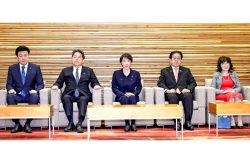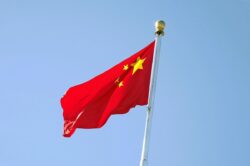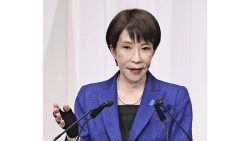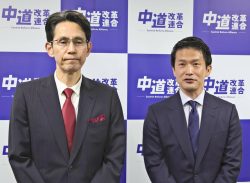Cherry-blossom Viewing Party Investigations Set to Change Japan Ruling LDP Dynamics
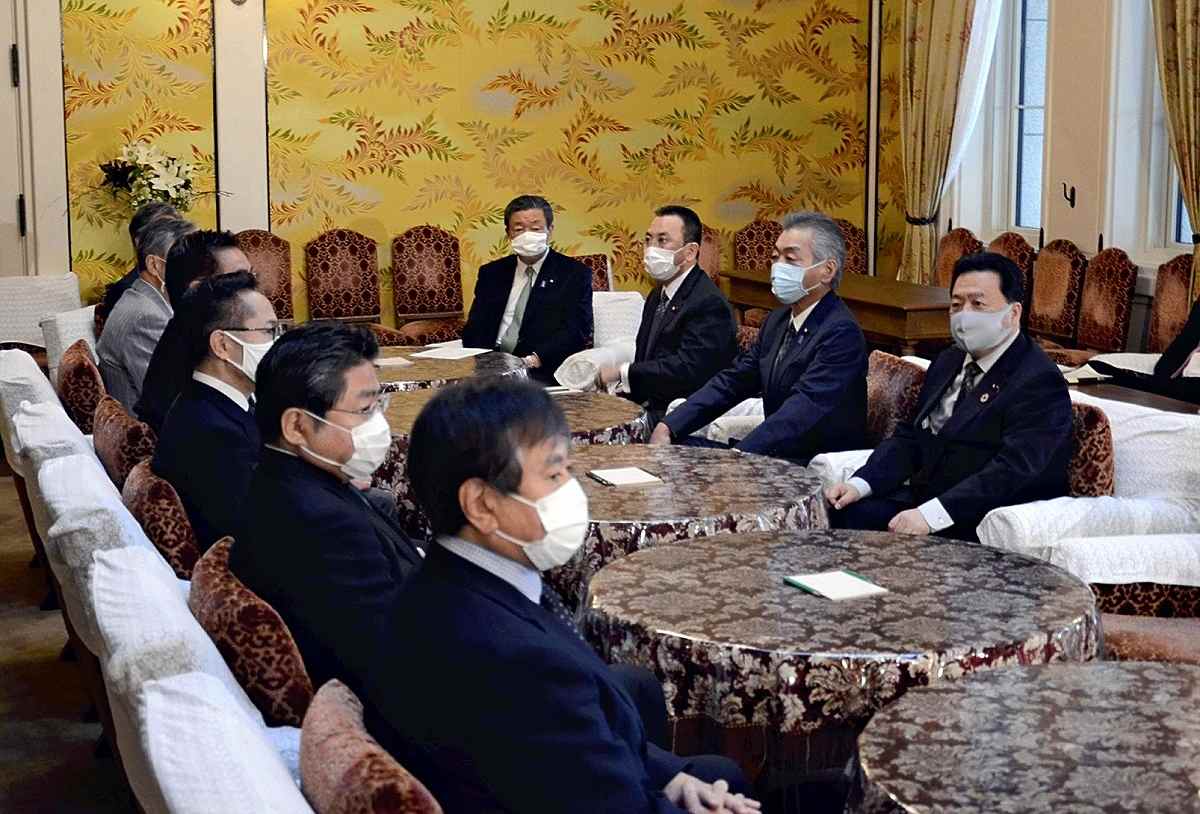
Chairpersons of the Diet affairs committees of ruling and opposition parties attend a meeting at the Diet Building in Tokyo on Thursday.
14:47 JST, December 4, 2020
Former Prime Minister Shinzo Abe’s influence in the political world will inevitably diminish as prosecutors await an opportunity to question him voluntarily regarding dinner functions on the eve of cherry blossom viewing parties organized by Abe’s office.
The issue is likely to change the dynamics within the Liberal Democratic Party.
While the government and the ruling parties aim to calm the situation by closing the current extraordinary Diet session Saturday as scheduled, the opposition parties are calling for Abe to be summoned to the Diet. The cherry blossom viewing party problem is likely to linger.
Regarding the Tokyo District Public Prosecutors Office’s investigations, Chief Cabinet Secretary Katsunobu Kato said at a press conference on Thursday, “The government will refrain from answering questions on matters concerning the investigative authorities’ activities.”
There are inconsistencies between Abe’s remarks in Diet sessions and the prosecutors’ findings from their investigations on whether or not the shortfall of the dinner functions’ expenses was covered by Abe’s side. If the prosecutors find Abe’s denial of covering the shortfall was not true, he will be dealt a major blow.
A senior member of the Hosoda faction, to which Abe used to belong, said: “It’s simply a matter of hearing his side of the story. It’s probably a necessary procedure in order to conclude that there will be no criminal actions against Abe.”
The official said he does not expect the questioning to affect Abe’s rumored return to the Hosoda faction by the end of next year.
However, if a former prime minister is questioned by prosecutors, the impact will be huge.
“It will be difficult for [Abe] to work in the public arena as he did before. There will be no more talk about an attempt to become prime minister for a third time,” a former cabinet minister said.
Abe, who stepped down in September, resumed political activities in his hometown of Yamaguchi Prefecture in November and has gradually increased his presence since then.
He has ruffled feathers after repeatedly saying, “If it were up to me, I would dissolve the House of Representatives in January.”
On Thursday evening, he attended a dinner with Hosoda faction upper house members, and on Wednesday evening, he and Deputy Prime Minister Taro Aso attended a meeting of young lawmakers from the Hosoda and Aso factions in Tokyo.
This was presumably to demonstrate the close relationship between the Hosoda faction, the largest, and the Aso faction, the second largest, as well as keeping in check the Nikai faction, whose presence is growing under the current Yoshihide Suga administration.
However, the request to question Abe appears to have thrown cold water on the aims of the major factions.
A government source expressed dissatisfaction over Abe’s recent remarks, saying, “Dissolution of the lower house is exclusively up to Prime Minister Suga. Mr. Abe’s remarks were uncalled for. He should be a little quieter.”
Opposition turns up pressure on ruling bloc
The opposition parties, which have been pursuing allegations surrounding the blossom viewing parties, are stepping up their offensive.
The Diet affairs committee chairs of four opposition parties — the Constitutional Democratic Party of Japan (CDPJ), the Japanese Communist Party, the Democratic Party for the People and the Social Democratic Party — met with Hiroshi Moriyama, their counterpart in the ruling Liberal Democratic Party, on Thursday in the Diet building. At the meeting, the opposition parties called for an extension of the current Diet session, which is scheduled to end on Saturday, until around the end of the year.
At the meeting, the CDPJ’s Jun Azumi told Moriyama that refusing the extension “would be tantamount to forcibly closing the session in order to cover up the allegations.”
In response, Moriyama conveyed a policy of not extending the session. “The scheduled bills are now in sight,” Moriyama said. “We are on a tight schedule for budget proposal preparation.”
Later, the heads of four opposition parties’ secretariats, including the CDPJ, met in the Diet and decided to submit a motion on Friday to the House of Representatives to extend the session until Dec. 28. They also agreed to seek former Prime Minister Shinzo Abe’s testimony at the Diet.
However, the motion was expected to be rejected due to opposition from the ruling bloc and Nippon Ishin no Kai. Also, the ruling bloc is maintaining its stance of rejecting the idea of having Abe give testimony at the Diet.
Azumi gave a warning to the ruling bloc, saying, “The ordinary Diet session will not be able to start easily unless Mr. Abe fulfills his accountability.”
The opposition parties are prepared to thoroughly pursue allegations related to money in politics in next year’s ordinary Diet session. One of the allegations involves former Agriculture, Forestry and Fisheries Minister Takamori Yoshikawa of the LDP, who is suspected of receiving cash from an egg supplier.
Top Articles in Politics
-

LDP Wins Historic Landslide Victory
-

LDP Wins Landslide Victory, Secures Single-party Majority; Ruling Coalition with JIP Poised to Secure Over 300 seats (UPDATE 1)
-

Japan Tourism Agency Calls for Strengthening Measures Against Overtourism
-

CRA Leadership Election Will Center on Party Rebuilding; Lower House Defeat Leaves Divisions among Former CDPJ, Komeito Members
-

Voters Using AI to Choose Candidates in Japan’s Upcoming General Election; ChatGPT, Other AI Services Found Providing Incorrect Information
JN ACCESS RANKING
-

Japan Institute to Use Domestic Commercial Optical Lattice Clock to Set Japan Standard Time
-

Israeli Ambassador to Japan Speaks about Japan’s Role in the Reconstruction of Gaza
-

Man Infected with Measles May Have Come in Contact with Many People in Tokyo, Went to Store, Restaurant Around When Symptoms Emerged
-

China Eyes Rare Earth Foothold in Malaysia to Maintain Dominance, Counter Japan, U.S.
-

Prudential Life Insurance Plans to Fully Compensate for Damages Caused by Fraudulent Actions Without Waiting for Third-Party Committee Review


